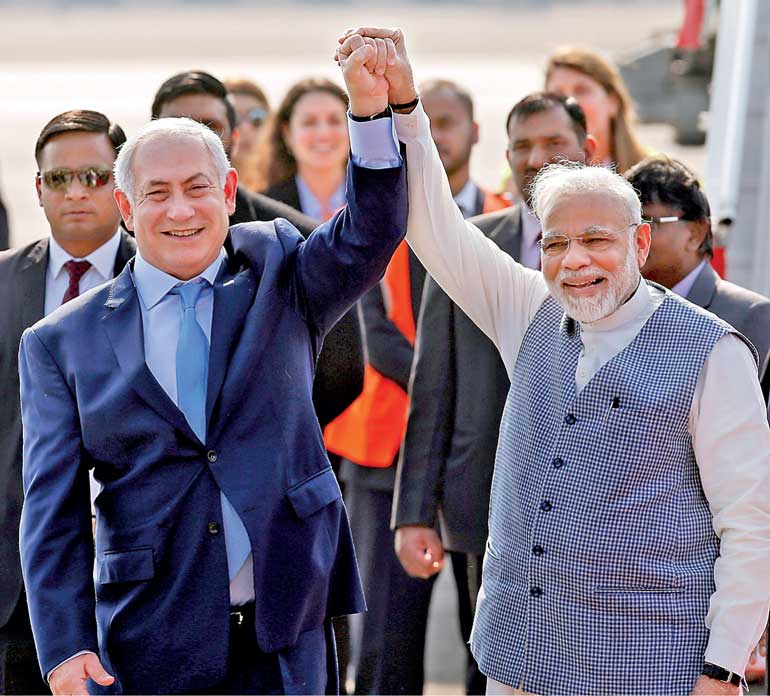Thursday Feb 19, 2026
Thursday Feb 19, 2026
Monday, 15 January 2018 00:00 - - {{hitsCtrl.values.hits}}
NEW DELHI (Reuters): Israeli Prime Minister Benjamin Netanyahu began a six-day visit to India on Sunday hoping to boost trade ties and iron out differences arising from New Delhi’s decision to scrap a defence deal, officials from both countries said.

Israeli Prime Minister Benjamin Netanyahu and his Indian counterpart Narendra Modi raise their arms upon Netanyahu’s arrival at Air Force Station Palam in New Delhi, India, January 14, 2018. REUTERS
Israel’s state-owned defence contractor Rafael announced on Jan. 3 that India had cancelled a $500 million order to buy its Spike anti-tank guided missiles. Indian media said Delhi would instead opt for home-made anti-tank missiles.
“If there is a problem, it can, it should and it will be solved,” said Daniel Carmon, Israel’s ambassador to India referring to the cancellation of the defence deal.
India is Israel’s biggest arms market, buying around $1 billion worth of weapons every year. Despite the cancellation of the missile deal, India’s Defence Ministry said this month it had cleared a plan worth $72 million to buy 131 Barak surface-to-air missiles built by Rafael.
The two countries have grown closer since Narendra Modi became Indian prime minister in 2014, widening commercial cooperation beyond their longstanding defence ties.
Netanyahu will be accompanied by a 130-member delegation drawn from the cyber and agriculture sectors as well as from defence. As well as New Delhi, they will also visit India’s financial capital Mumbai and Modi’s home-state of Gujarat.
“The intention of the prime minister and the whole delegation is to boost trade, investment and tourism between both countries,” said Gilad Cohen, deputy director-general for Asia and the Pacific in Israel’s foreign ministry.
Deals for gas and oil cooperation, cyber security and agricultural projects are on the agenda.
The trip comes about half a year after Modi became the first sitting Indian prime minister to visit Israel. On that trip Modi did not travel to the occupied West Bank to meet Palestinian leaders, as visiting leaders usually do.
However, India was among more than 120 countries last month to vote in favour of a resolution calling for the United States to drop its recent recognition of Jerusalem as Israel’s capital. The status of Jerusalem is one of the thorniest obstacles to a peace deal between Israel and the Palestinians, who want East Jerusalem as the capital of a future state.
Carmon said India’s vote against Israel at the UN General Assembly on the Jerusalem issue would not affect bilateral ties.
“The vote at the UN is important, but it will not mar the big picture of the India-Israel relationship,” he said.
Foreign policy experts in New Delhi said Modi had made significant changes in diplomatic and strategic ties with Israel while at the same time retaining links with Palestinian leader Mahmoud Abbas.
Before Modi visited Israel in July 2017 he hosted Abbas in India and offered help in health and information technology, but the trip was low-key.